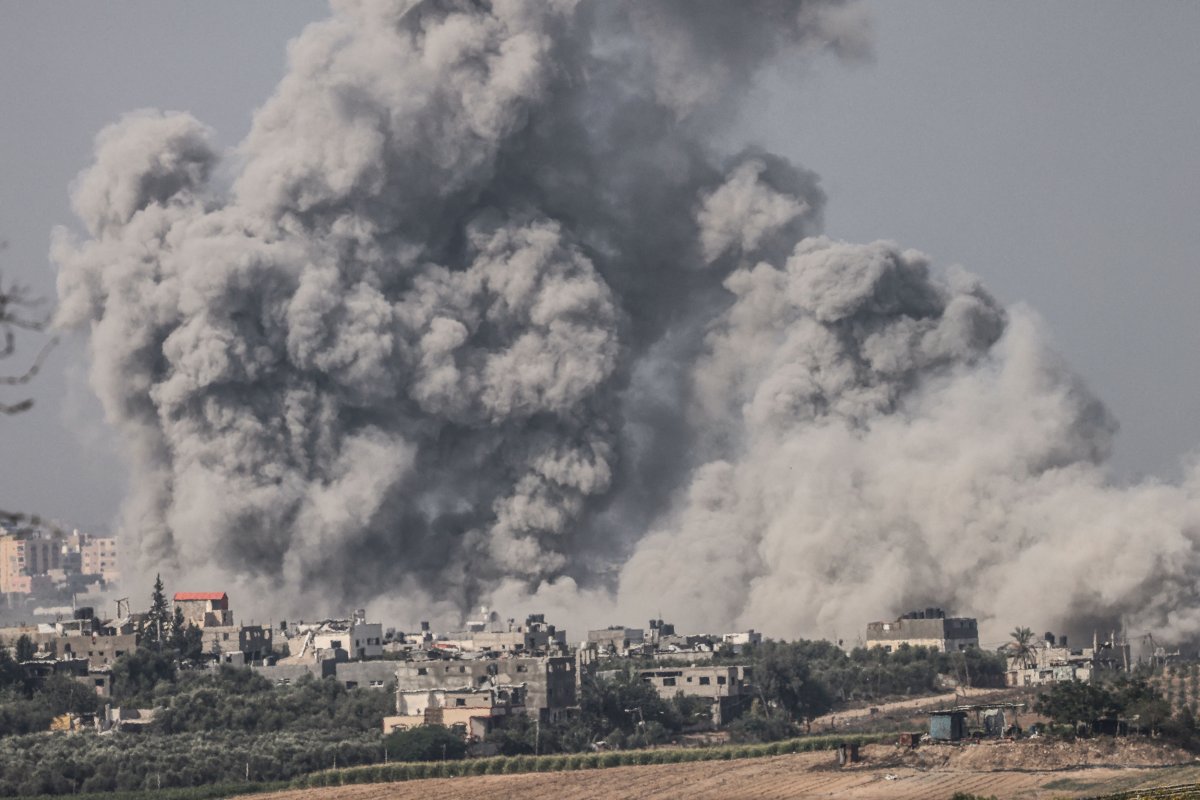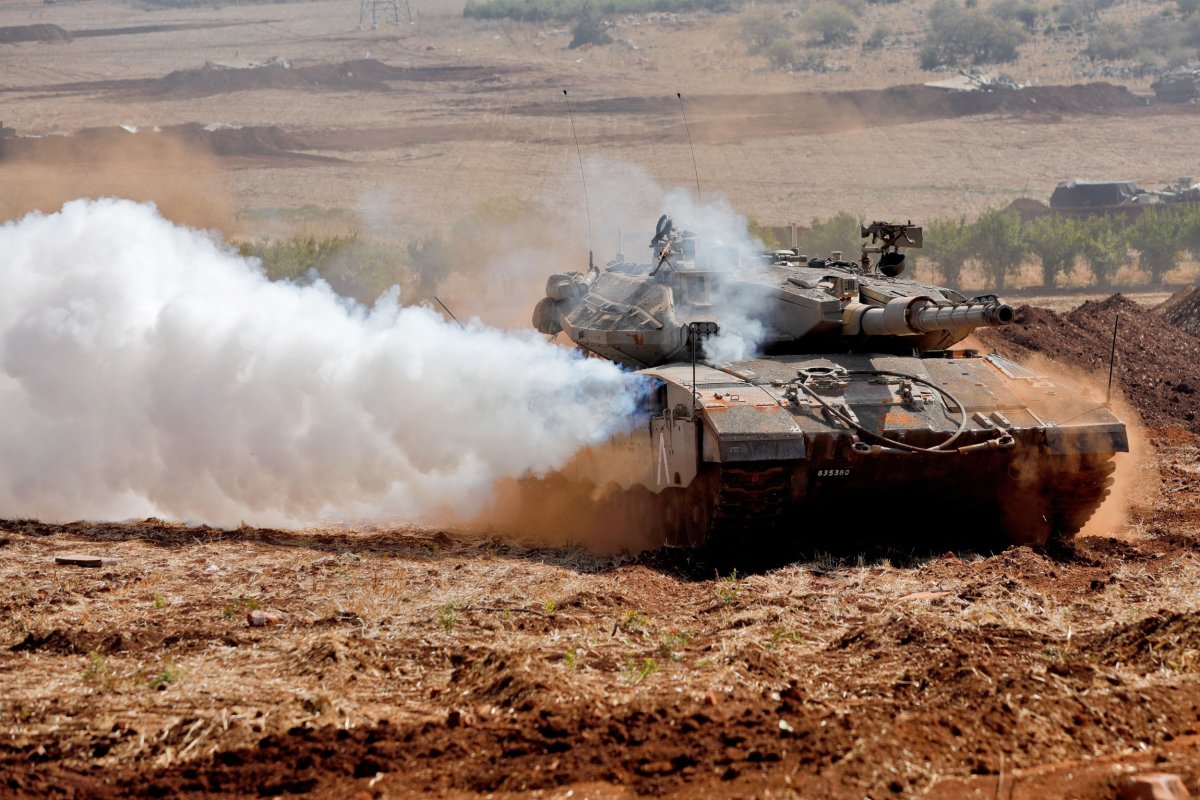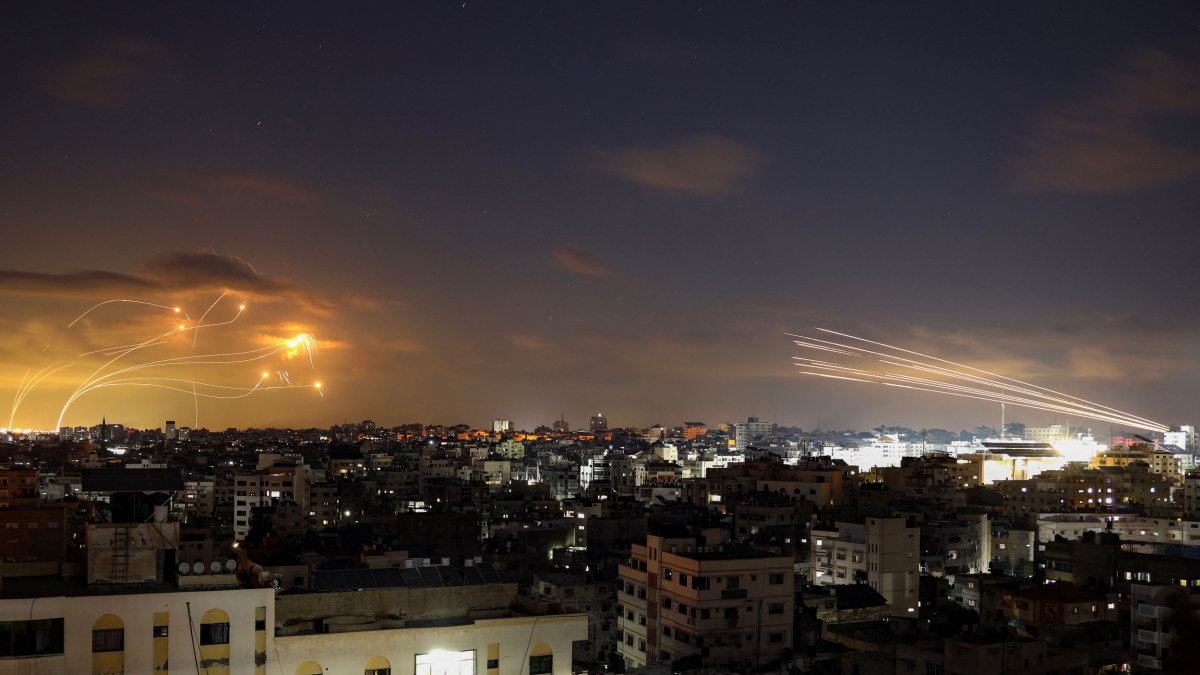Tom O'Connor
Former Israeli Prime Minister Ehud Barak has outlined in an exclusive interview with Newsweek what he termed the four "constraints" in Israel's ongoing war effort against the Palestinian Hamas movement.
Barak served as Israeli premier from July 1999 to March 2001, having succeeded current Prime Minister Benjamin Netanyahu after his first of what would be three non-consecutive stints in office. Before entering politics, Barak oversaw Netanyahu as commander of the elite special forces unit known as Sayeret Matkal in which they both served. He's also held a number of other senior military and political positions over the decades, and has emerged as one of Netanyahu's most influential critics.
But today, Barak sees the war as the most important issue his country is facing. He points to four "constraints" in particular that weigh on the Israel Defense Forces' (IDF) "Operation Swords of Iron," launched October 8, one day after Hamas' unprecedented Operation "Al-Aqsa Flood" air, land and sea assault took Israel by surprise.
With the IDF set to launch a ground campaign into Gaza, Barak detailed the considerations that will have to be taken into account regarding hostages, escalations, governance and public support in order to produce a winning outcome.

A picture taken from the southern Israeli city of Sderot on October 23, shows smoke ascending over the northern Gaza Strip following an Israeli strike, amid the ongoing battles between Israel and the Palestinian militias led by Hamas. Thousands of people, both Israeli and Palestinians have died since October 7, when Hamas launched its unprecedented "Al-Aqsa Flood" suprise attack and the IDF commenced a historic bombing campaign called "Operation Swords of Iron.
A Historic Hostage Crisis
The first constraint identified by Barak is the issue of what the IDF has estimated to be 222 people seized by Hamas and other Gaza-based Palestinian factions in the opening stages of the war.
"For many reasons, the hostage cause is more complicated than previous clashes," Barak told Newsweek. "The amount of people, the fact that probably more than a quarter of them have not just Israeli passports, they have foreign passports, they are citizens of the United States, the United Kingdom, or Europe, some even citizens of Thailand or Nepal, and others are Israelis or have double passports."
Such an operation, of a kind which Barak is personally familiar given his Sayeret Matkal experience, "needs so much intelligence to be so accurate, such a tightly controlled situation, and there are so many lessons learned along the decades by the terror organizations, how to organize, how to spread them, even almost not knowing themselves where everyone is now," Barak said.
Hamas' military wing, the Al-Qassam Brigades, has previously threatened to execute detainees in response to Israeli airstrikes on civilian sites in the Gaza Strip. At the same time, the Palestinian militia has more recently said that the prisoners it is holding, estimated to be between 200 and 250, are being treated well, and that it was prepared to release non-Israeli captives under the right conditions. The group also said 22 detainees were killed as a result of Israeli strikes—a claim that was met with skepticism by the IDF.
So far, at least two Israeli hostages and two U.S. hostages have been released in separate agreements mediated by Qatar and Egypt and subsequently made public. Members of Hamas' political leadership, such as Khaled Meshal, have suggested the group would free prisoners in exchange for the release of all Palestinians from Israeli prisons, who number around 6,000, according to Meshal.

Former Prime Minister of Israel Ehud Barak poses for a portrait in his office on July 18 in Tel Aviv, Israel. A leading critic of current Israeli Prime Minister Benjamin Netanyahu, whom he once oversaw during their service in the elite Sayeret Matkal, Barak today looks to put political quarrels aside to navigate one of the most difficult moments in Israel's history.
A Widening War
As the conflict deepens, however, Hamas has called on Arabs and Muslims to actively support the Palestinian war effort against Israel. Already, the Lebanese Hezbollah movement has conducted cross-border attacks and other factions of the Iran-aligned "Axis of Resistance" have expressed support, with at least one organization calling itself the Islamic Resistance in Iraq claiming daily attacks on U.S. troops in Iraq and Syria.
Tehran itself has also expressed its ardent support for Hamas and other Palestinian factions, which have also risen up in Jerusalem and the West Bank.
"The second constraint is the worry that it could spread or migrate to the northern front as well, where we find ourselves dealing not only with Hamas in Gaza, but subsequently with Hezbollah in the north, probably with some dormant cells of Hamas, Islamic Jihad or others in the West Bank," Barak said, "and probably even with some Shiite militias backed by the Iranians that are deployed in Syria, beyond the Golan Heights, on the Syrian side."
Israel's hostile, disputed borders with Lebanon and Syria have been the sites of major battles in past decades, the latest being Israel's 2006 war with Hezbollah in Lebanon. When Syria's civil war erupted in 2011, Hezbollah and other "Axis of Resistance" militias mobilized in support of the Syrian government with backing from Iran against rebel and jihadi groups.
As these militias entrenched themselves, Israel has accused them of establishing forward operating bases and accumulating precision guided munitions to be used in the event of a broader conflict, and the IDF has conducted a years-long semi-covert series of airstrikes against suspected Iran-tied sites in Syria.
So far, these actors have engaged in only limited operations, though the risk of escalation remains, regardless of whether or not it is intentional, especially as the IDF plans a ground incursion into the Gaza Strip to eradicate Hamas.
"We have no interest in spreading it to the north. I would not recommend to Hezbollah or to Lebanon to be involved, but it is beyond our control," Barak said. "I think there is a certain impact of deterrence to the very presence of the American forces here, and the visit of the president and the secretary of defense and other senior American officials. It has an impact on Hezbollah, the Lebanese government, probably even Iran."
"But it's not a guarantee that it won't happen," Barak cautioned. "Even if both sides do not want it, it might happen as a result of friction and skirmishes that happen every day. It can easily deteriorate into full-scale war."
Barak emphasized, however, that "even if we deal with the whole thing, it will be tougher, it will take a longer time to overcome, we'll have to invest more toil and sweat and tears and blood, but Israel will win."

An Israeli Merkava tank takes part in a military drill near the border with Lebanon in the upper Galilee region of northern Israel on October 24, amid increasing cross-border fire between Israel and Hezbollah. The powerful Lebanese movement has declared its support for Hamas and other Palestinian factions, as have a growing number of other Iran-backed militias across the Middle East.
No Successor for Hamas
What victory looks like for Israel also remains a point of uncertainty. Even if the IDF succeeds in its effort to render Hamas inoperable as a functioning military entity and neutralizes other hostile Palestinian factions such as Islamic Jihad, there is no easy substitute in place to govern the roughly 2.2 million people living in the Gaza Strip.
As such, the third constraint identified by Barak "is the need to think in advance to whom we will pass the torch."
If the IDF manages to "clean all the Gaza Strip from any physical assets of Hamas and hopefully decimate its fighting force, then we have to pass it on to someone," Barak said. He said Israel does "not plan to go back into all of Gaza for the next 10, 20 years or so."
One potential candidate is the return of the Palestinian National Authority (PA), which is based in the West Bank and led by President Mahmoud Abbas. But, as Newsweek reported in the weeks leading up to the current war, the PA is already facing a historic crisis of legitimacy, and Hamas has increasingly eclipsed Abbas and his secular Fatah party in terms of popularity and support.
A year after the IDF disengaged from the Gaza Strip in 2005 from nearly four decades of occupation in the wake of the 1967 Six Day War, the PA held legislative elections that delivered a victory to Hamas. Already strained relations between the two Palestinian parties quickly devolved into active clashes, leading to Hamas' takeover of Gaza, which it has ruled ever since in the absence of any subsequent effort by the PA to hold new elections.
Barak has dealt firsthand with the issue of Gaza's governance. He recalled that when he served as defense minister, around the time of Israel's first major war with Hamas-led Gaza in 2008, he proposed to Abbas and then-Egyptian President Hosni Mubarak the establishment of a multinational Arab force to step in after Hamas' defeat for a period of three to six months to allow for the return of PA administration, but they declined his offer.
Today, however, Barak pointed out how the geopolitics of the region have shifted significantly and that "nothing is impossible." In fact, he suspected that "a certain kind of attempt to sniff whether such an arrangement or something similar is possible probably takes place behind closed doors, even while we're talking."
"I hope it will be successful, but for sure certain ideas as to whom we will be able to pass the torch would be better clarified before we go deep into Gaza," he added, "because otherwise once again it starts to emerge as something you first enter, then think. It's not a good recipe for strategic success."

A picture shows rockets fired from the Gaza City (right) being intercepted by Israel's Iron Dome defense system (left) on October 10. After regaining control of border crossings, the IDF has openly discussed the likelihood of a full-scale ground incursion into Gaza.
Terms of Engagement
The final constraint mentioned by Barak is that of Israel's "commitment to oblige by international law" in an escalating conflict in which both sides have accused one another of committing war crimes.
"There are laws of war and it is a constraint," Barak said. "However effective and sincere our efforts will be to follow the law and to warn everyone and to make sure that they had a genuine opportunity to leave those parts of Gaza which are targets that have to be spotted and hit, there will be and already is a significant number of civilians who are not involved and killed."
This, he argued, is "the result of liberal use of civilians as human shields by Hamas." Hamas has denied this practice, alleging that the IDF targets civilians, something Israeli officials reject.
Still, Barak warned that backlash over civilian casualties "quite quickly might erode the legitimacy of our position," threatening "the universal support that we have right now."
The IDF has sought to get ahead of the narrative, engaging regularly with journalists directly, especially on high-profile incidents such as the disputed attack last week on the Al-Ahli Arab Baptist Hospital.
Hamas and a number of Arab and Muslim countries, as well as some international NGOs, quickly argued that an Israeli airstrike was responsible for the deaths of up to 500 civilians at the facility, but the IDF shared intelligence purporting to show that an errant rocket fired by Islamic Jihad struck the site, resulting in a much lower casualty count than had been initially reported. The Israeli assessment was backed by President Joe Biden and U.S. intelligence officials.
But Hamas too has developed a sophisticated public affairs campaign, conducting outreach to international reporters and broadcasting messages across social media. As the real-life conflict continues to erupt, both sides are waging an information war in full capacity.
With the fog of war and operational security hampering the flow of accurate information, Barak said it was up to only those with access to timely, accurate data to navigate the next steps of the conflict.
"How all these constraints, which are in a way interconnected and dynamic and take time to develop, will decide or influence the actual steps to be taken," Barak said, "is a matter of data, facts and the capacity to know what happens in real time."
"Usually, the public doesn't have this information and I probably have more information than you or the general public, but even I do not know enough of the details, close enough to the time of their emergence," he added. "They can develop in many ways. It's up to the supreme military commands and the war cabinet on the political level to make the decisions."
No comments:
Post a Comment